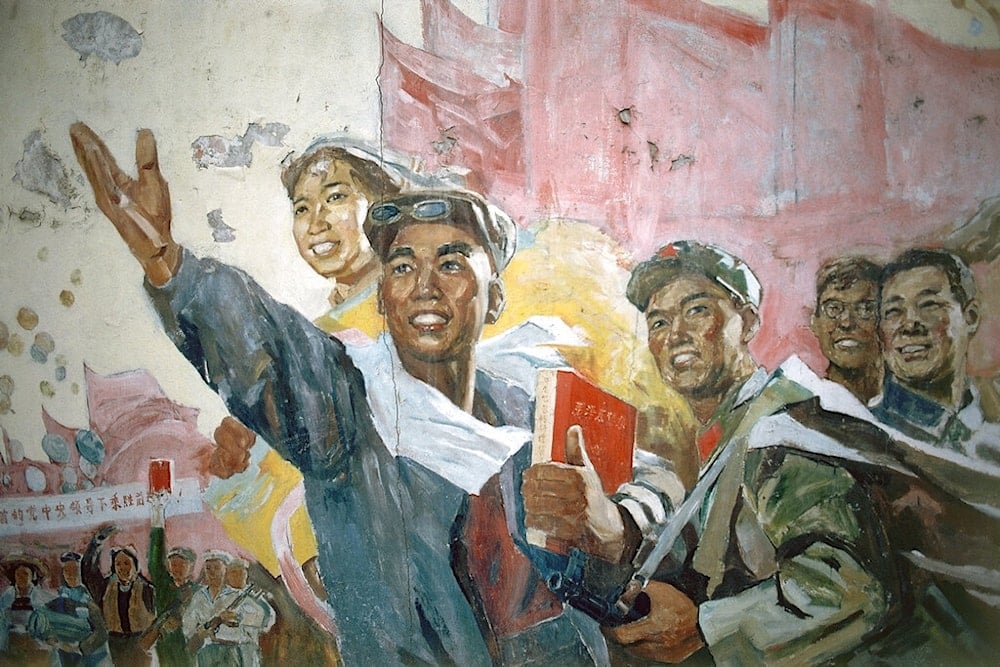Mao resurrect: Beijing rallies public for protracted US trade war
Beijing Daily invoked Mao Zedong's "On Protracted War" to urge national resilience amid escalating US tariffs, framing the trade conflict as a long-term struggle against American attempts to suppress China's rise and calling for unity, self-reliance, and strategic patience.
-

A Chinese revolutionary propaganda billboard in Zibo, a city in Shantung province of China, on January 28, 197,9 shows workers and soldiers holding the red Mao book. (AP Photo/Neal Ulevich)
The state-run newspaper affiliated with the Chinese Communist Party's municipal committee in Beijing, the Beijing Daily, called on the Chinese public on Tuesday to revisit Mao Zedong's 1938 essay "On Protracted War," saying it offers "great inspiration for the international struggles of the new era" as tensions with the United States intensify.
Framing the escalating trade war through a historical lens, the commentary urged citizens to adopt a mindset of patience, resilience, and self-reliance, drawing parallels between China's current standoff with Washington and its long resistance against Japanese aggression. Beijing Daily suggested that Mao's writing could instill confidence in the nation's eventual success in the ongoing economic confrontation, emphasizing that endurance, not illusions of a quick resolution, would be key to prevailing.
The editorial stressed the need to discard "attitudes of a defeatist mindset" and abandon "illusions of a quick win," referencing the deepening tariff war triggered by the Trump administration's "Liberation Day" tariff plan. Under the latest escalation, Washington has raised tariffs on Chinese goods to an effective rate of 145 percent, while Beijing has countered with 125 percent duties on American imports.
"The situation has evolved far beyond what the US side anticipated," Beijing Daily wrote, highlighting that China's government was the first to declare a firm stance of "fighting to the end." It noted that international opposition to Washington's "bullying tactics" had only grown louder.
Reject defeatism
While rejecting defeatism, the editorial also warned against misplaced optimism, warning that believing China is close to a full victory could be equally dangerous. According to Beijing Daily, "there were still 'erroneous viewpoints', including that China should find a way to quickly compromise and reach an agreement with the Trump administration."
Mao's 1938 essay, written during the difficult early stages of the Second Sino-Japanese War, rejected both the belief in an imminent foreign-assisted victory and the fear of inevitable defeat. Instead, he outlined a phased approach: beginning with strategic defense, enduring a prolonged stalemate, and finally achieving victory through accumulated strength and perseverance. Beijing's reference to Mao conveys China's belief that the current competition with the US will similarly be a battle of attrition and endurance.
Since assuming leadership in 2012, President Xi Jinping has consistently encouraged Communist Party members to draw strategic lessons from Mao's writings, particularly "On Protracted War." During a 2020 Politburo meeting, Xi noted, "Many of the problems we face are medium- and long-term, and we must understand them from the perspective of a protracted war," according to Xinhua.
Protracted struggle
In its latest commentary, Beijing Daily described US tariff measures as a "butcher's knife," warning that appeasement would not ensure survival. The paper denounced the fantasy held by some countries that "feeding themselves to the wolves" could bring "a brief moment of precarious peace," affirming instead that "hoping for leniency through unilateral concessions was simply 'not a viable path.'"
Quoting Mao, the editorial reminded readers that "the soldiers and the people are the foundation of victory," adding that today, success demands mobilizing all social forces toward development, innovation, and domestic strength amid external pressure.
The commentary aligned with the Chinese government's broader narrative that the Trump administration's aggressive tariff policies are not about fair trade but a calculated effort to weaken China's rise, contain its technological advancement, and prolong US global dominance. From Beijing's perspective, Trump's strategy is a deliberate form of "strategic suppression," aimed at forcing economic decoupling and sabotaging China's industrial modernization.
China's leadership, the editorial insisted, had long anticipated the protracted nature of its rivalry with Washington, preparing through national strategies focused on technological self-reliance, industrial upgrading, and reinforcing social resilience. The piece praised the Chinese public for demonstrating "a high degree of unity and a strong sense of historical agency," declaring that "this national capacity for self-awakening, self-adjustment, self-pressure and self-optimisation is the core support for eventual victory in the protracted struggle."
Read more: Tariffs won't sway US allies against China: Bloomberg
The publication of the commentary comes as Beijing reaffirms its firm resolve to safeguard national interests, with Chinese officials rejecting unfounded speculation about diplomatic progress and firmly confronting the US' unfair trade practices.
Speaking at a BRICS foreign ministers' meeting in Rio de Janeiro, Foreign Minister Wang Yi warned that acquiescence would only embolden further aggression. "If one chooses to stay silent and compromise, it will only embolden the bullies to push further," Wang said, according to Xinhua. He also called on the expanded BRICS coalition, which now includes Egypt, Iran, Indonesia, and others, to jointly resist protectionism and defend the multilateral trading system anchored by the World Trade Organization.

 5 Min Read
5 Min Read








